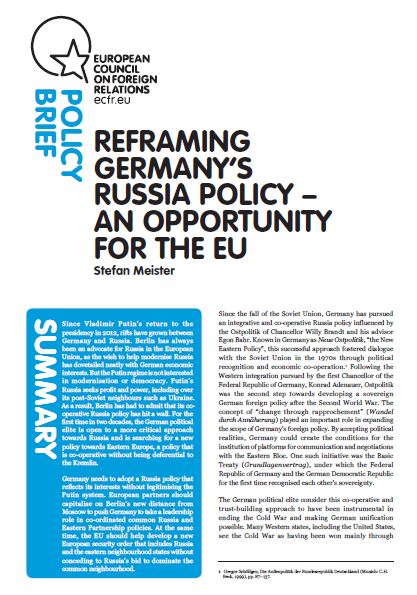Reframing Germany’s Russia policy – an opportunity for the EU
Ukraine crisis shows Berlin’s Russia policy is out of date
Germany and the EU need a new security policy to include Russia and Eastern neighbourhood states which does not bow to domination by Moscow. In this new report, Stefan Meister says EU states should push Germany to take a leading role which is less deferential to the Kremlin.
As the crisis in Ukraine continues to deepen, Germany’s policy towards Russia is too idealistic and not compatible with Putin’s realpolitik towards post-Soviet neighbours. Meister suggests:
- A new German policy towards Eastern Europe should be co-operative without being deferential towards the Kremlin.
- European partners should capitalise on Berlin’s new distance from Moscow to push Germany to take a leading role in common Russia and Eastern Partnership policies.
- At the same time, the EU should help develop a new European security order that includes Russia and Eastern neighbourhood states without bowing to Moscow’s desire to dominate its near abroad.
“Germany has sought political change through economic co-operation, but Russia’s elite wants the transfer of technical know-how without political reform. The reality is that Russia’s elite has long grasped that the rule of law, transparency, and increased political competition would curtail their power, privileges, and rent-seeking opportunities.”
“The current moment has brought about a real shift and a great opportunity to develop EU policy towards Russia. The grand coalition in Berlin is headed by a chancellery that is more critical of Russia than previous governments, and the crisis in Ukraine has shown the German leadership the significance of the eastern neighbourhood.”
Background: Since Vladimir Putin’s return to the presidency in 2012, rifts have grown between Germany and Russia. Berlin has always been an advocate for Moscow in the European Union as Russia’s modernisation dovetails neatly with German economic interests.
The European Council on Foreign Relations does not take collective positions. ECFR publications only represent the views of their individual authors.



